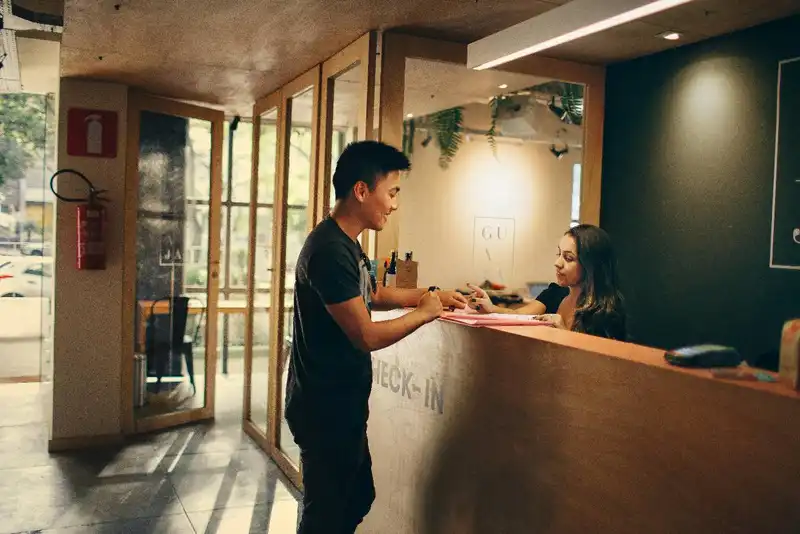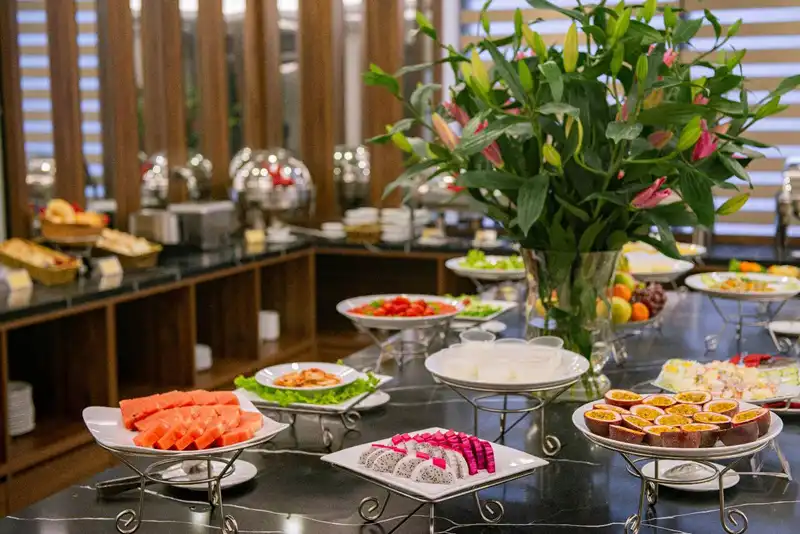Why is authenticity important in job descriptions?
Authenticity in job descriptions fosters transparency by setting clear expectations for candidates and aligning organizational values with individual aspirations. Genuine portrayals attract candidates who resonate with the company culture, leading to better-fit hires. Honest communication also establishes trust, contributing to long-term employee satisfaction and retention.
The Plan to Advance Hotel Careers
Community Engagement and Social Responsibility
A commitment to community engagement and social responsibility serves as a hallmark of a hotel's values and corporate ethos. Within the hospitality industry, there exists a notable establishment that proudly embraces a robust framework of initiatives and partnerships designed to create a positive impact on the communities it serves.
This hotel's ongoing collaborations with local organizations underscore its dedication to being a responsible corporate citizen. Actively participating in community-driven projects, this establishment goes beyond philanthropy, prioritizing sustainable, long-term solutions that address local needs and foster community well-being.
Candidates considering a role within this hotel become integral contributors to these impactful efforts. From participating in local outreach programs to volunteering with partnered organizations, employees have the opportunity to directly engage with the community. This hands-on involvement fosters a sense of pride among the staff as they become part of an organization that extends beyond traditional hospitality boundaries, contributing to the broader social fabric.
A notable initiative within this establishment is its commitment to environmental sustainability. Through innovative practices and partnerships with eco-conscious organizations, this hotel continuously strives to minimize its ecological footprint. Candidates joining the workforce actively participate in these efforts, contributing to a greener future while aligning with a socially responsible establishment.
Furthermore, community engagement extends to educational initiatives, with collaborations established with local schools and institutions. Employees have the chance to serve as mentors, sharing their expertise and passion for hospitality with the next generation. This not only enriches the community but also provides team members with a platform to develop leadership skills and contribute to the growth of aspiring professionals.
The commitment to community engagement and social responsibility within this establishment goes beyond mere rhetoric; it is deeply ingrained in its organizational DNA. Candidates within the hospitality careers are invited to recognize the value of aligning with an establishment that excels in service while standing as a beacon of responsible corporate citizenship, making a lasting difference in the communities it serves.
Crafting Compelling Job Descriptions

A meticulous job description begins with a succinct yet detailed job title, reflecting the role's essence. Followed by a brief introductory paragraph, it sets the tone for what follows. Clear and concise language is crucialavoid jargon and industry-specific terms that may alienate potential candidates. Outline key responsibilities with bullet points, highlighting the core functions of the role. Specify qualifications, skills, and experience requirements, ensuring that expectations are transparent.
Comprehensive Overview of Roles and Responsibilities
Transparency in outlining roles and responsibilities serves as a linchpin for managing candidate expectations. Potential hires gain a realistic understanding of their day-to-day tasks, fostering informed decision-making. In the hospitality industry, this is particularly crucial, as roles often demand a unique blend of skills and a customer-centric approach. Whether it's a front-of-house position or a back-end role, detailing responsibilities aids in aligning candidate aspirations with the actual demands of the job.
The Significance of Precision
Precision in language prevents ambiguity and helps candidates envision themselves in the role. Clearly articulated expectations not only attract candidates who genuinely resonate with the position but also dissuade those whose skills may not align. Precision is a time-saving measure for both recruiters and candidates, leading to more focused and efficient hiring processes.
Attracting the Right Candidates
A well-crafted job description is your hotel's first impression on potential team members. It should reflect the organization's values and culture. Use language that resonates with the unique atmosphere of your hotel, whether it's a boutique establishment or a large resort. This not only attracts candidates who align with your ethos but also filters out those who may not thrive in your specific work environment.
The meticulous construction of a job description is an integral part of the hospitality industry's talent acquisition strategy. By focusing on clarity, precision, and providing a comprehensive overview of roles and responsibilities, hotels can ensure that they not only attract a pool of qualified candidates but also set the stage for successful and mutually beneficial professional relationships.
Innovative Restaurant Software Solutions
Modernize Your Recruitment Process with Altametrics
Emphasizing Company Culture
By strategically emphasizing the company culture, job postings become more than just a list of qualifications and responsibilitiesthey become a glimpse into the heart of the organization. Executives in the hospitality industry understand that a positive work environment and shared values are critical for employee satisfaction, which directly correlates with guest satisfaction.
To effectively communicate company values, job postings should explicitly outline the principles and beliefs that define the organization. Whether it's a commitment to exceptional guest service, a dedication to sustainability, or a focus on employee development, these values should be articulated clearly and concisely. This transparency enables potential candidates to align their personal values with those of the hotel, fostering a sense of connection from the very beginning.
Describe the work environment, which is equally crucial. Highlighting aspects such as a collaborative team culture, opportunities for professional growth, and a supportive leadership style paints a vivid picture for prospective employees. Executives can showcase the tangible benefits of working within the organization, illustrating how the company culture translates into day-to-day experiences for employees.
The overall ethos of the hospitality business should be woven into the fabric of the job posting. Whether it's an unwavering dedication to guest satisfaction or a commitment to innovation, this overarching philosophy provides a guiding light for potential candidates. Executives understand that attracting individuals who resonate with this ethos is key to fostering a team that works cohesively towards shared goals.
Aligning job postings with a hotel's culture has a profound impact on attracting candidates who not only possess the necessary skills but also share similar values. This alignment creates a foundation for a cohesive team, where individuals are not just employees but ambassadors of the company's culture. It fosters a sense of belonging and collective purpose, leading to increased employee engagement and retention.
Executives in the hospitality industry recognize the power of job postings to changing the narrative of their organizations. By strategically showcasing the unique culture, values, and ethos, these postings become a magnet for talent that not only meets the job requirements but also contributes to the vibrant tapestry of the company's identity. In the fiercely competitive world of hospitality, a well-crafted job posting is an invitation to join a community that shares a common vision and set of values.
Visual Storytelling
Professional hotel executives recognize that incorporating compelling visuals is not just an industry trend but a strategic necessity. When it comes to job postings, the judicious use of images and videos can elevate the allure of a position, offering potential candidates a vivid glimpse into the daily life and atmosphere of the hotel.
Images are a powerful tool for conveying the essence of a workplace. High-quality photographs showcasing well-appointed workspaces, smiling team members engaged in collaborative tasks, and glimpses of the hotel's distinctive features provide a visually appealing narrative. These visuals serve as a window into the dynamic environment candidates can expect, instilling a sense of excitement and connection.
Videos, when employed thoughtfully, bring the job advertisement to life. A brief video tour of the hotel, snippets of team interactions, and testimonials from existing staff create a multimedia experience that resonates with potential candidates. It goes beyond mere words on a page, offering a tangible feel for the work culture and camaraderie within the organization.
To maintain professionalism in job advertisements while incorporating visuals, precision is key. Opt for images and videos that align with the values and brand identity of the hotel. Candid shots capturing genuine moments are more compelling than staged scenes. Strive for authenticity, letting the visuals speak to the unique character of the hotel and the opportunities it presents.
When selecting visuals, consider the target audiencehospitality professionals seeking not just a job but an immersive experience. Highlight aspects of the workplace that set it apart, whether it's the sophisticated design of the lobby, the culinary creativity in the kitchen, or the seamless coordination of the front desk. Authentic visuals not only attract qualified candidates but also help in aligning expectations, reducing turnover, and fostering a positive work environment.
The role of visuals in job advertisements for the hospitality industry is paramount. Smartly integrating images and videos offers a compelling narrative that goes beyond job descriptions, resonating with potential candidates on a visceral level. The key lies in selecting visuals that authentically capture the spirit of the hotel, balancing the allure of the workplace with the professionalism expected in the industry.
Collaborative Work Environment

Teamwork and effective communication are the linchpins of success in the hospitality industry. Emphasizing these aspects in job postings is not merely a recruitment strategy; it's a declaration of commitment to delivering exceptional guest experiences. In this bustling sector, seamless collaboration is the key to orchestrating the symphony of services that create memorable moments for patrons.
The benefits of teamwork in the hotel sector are manifold. It enhances operational efficiency, ensures a seamless guest experience, and enables employees to leverage their diverse skill sets. A collaborative environment fosters creativity and innovation, driving the constant evolution required to stay ahead in this competitive industry. From the kitchen to the front desk, every cog in the hospitality wheel plays a crucial role, and teamwork is the lubricant that keeps it turning effortlessly.
Effective communication is the adhesive that binds a hotel team. Clear, concise communication is the heartbeat of any successful operation. Whether it's conveying guest preferences, coordinating room turnovers, or orchestrating a flawlessly timed dining experience, communication is the conduit through which excellence flows.
To attract candidates who thrive in collaborative settings, job advertisements must go beyond generic descriptions. Highlighting a commitment to teamwork and effective communication is non-negotiable. Showcase success stories of teams working in unison to exceed guest expectations. Illustrate the tangible outcomes of collective effortbe it in streamlined processes, enhanced guest satisfaction scores, or innovative solutions to challenges.
Conveying a sense of camaraderie in job advertisements requires authenticity. Use real-life examples of team achievements, and let the language reflect the spirit of collaboration within your organization. Words like "collaborative culture," "team synergy," and "shared success" should permeate the job postings, underscoring the organization's commitment to creating an environment where everyone contributes to collective success.
A collaborative and inclusive work environment is not just a virtue but a necessity in the hospitality sector. Executives in the industry must recognize that attracting top talent begins with the language used in job postings. By accentuating the benefits of teamwork and effective communication and incorporating various types of work that highlight a genuine sense of camaraderie, hospitality organizations can ensure they are not just filling positions but building teams that consistently deliver exceptional guest experiences.
Inclusive Job Postings
Language choices play a crucial role in attracting a diverse range of candidates. Utilizing inclusive language that embraces diversity and avoids any unintentional biases is paramount. Instead of specifying gender or age requirements, focus on skills and qualifications essential for the role. For instance, use terms like "team player" and "collaborative" to emphasize a welcoming work environment.
Phrasing matters. Opt for inclusive phrases that resonate with a broad audience. Rather than using language that may alienate certain groups, opt for statements that highlight equal opportunities and a commitment to creating an inclusive workplace. Communicate the hotel's dedication to fostering a diverse team where everyone's unique strengths are valued.
The positive impact of a diverse workforce on guest experiences cannot be overstated. Guests come from various backgrounds and cultures, and having a team that mirrors this diversity ensures a more nuanced understanding of their needs and expectations. A diverse staff can enhance the overall guest experience by creating an environment where guests feel seen, heard, and well-cared for, regardless of their background.
Team dynamics also benefit tremendously from diversity. Different perspectives and experiences bring creativity, innovation, and a broader range of problem-solving approaches. A diverse team can adapt more effectively to the ever-changing demands of the hospitality industry, providing a competitive edge in a market that values adaptability and fresh ideas.
The hospitality industry thrives on its ability to cater to a diverse and global clientele. Crafting inclusive job postings is the first step in building a team that reflects this diversity. The language used in job postings should be a beacon of the hotel's commitment to inclusivity, creating an environment where employees and guests alike feel valued. The positive impact of a diverse workforce on guest experiences and team relationships is a strategic imperative for sustained success.
Incorporating Technology
The integration of technology has become paramount for hotel operations to stay ahead of the curve. Embracing technology not only modernizes daily tasks but also serves as a unique selling point for attracting top-tier talent. Forward-thinking hotels that leverage innovative systems such as mobile check-ins, smart room controls, and data analytics are positioned not just as accommodation providers but as pioneers in delivering a seamless and tech-savvy guest experience.
Mobile check-ins have revolutionized the traditional check-in process, allowing guests to bypass queues and enjoy a swift and contactless arrival experience. This not only enhances efficiency but also aligns with the growing demand for convenience in today's fast-paced world. Smart room controls take guest comfort to the next level, enabling personalized adjustments to lighting, temperature, and entertainment systems at the touch of a screen or voice command. Such features contribute significantly to a memorable and enjoyable stay, setting a hotel apart in the eyes of discerning guests.
Data analytics play a major role in understanding guest preferences and behavior. By harnessing the power of data, hotels can tailor their services to meet individual needs, offering a personalized and bespoke experience. This not only fosters guest satisfaction but also establishes a foundation for customer loyalty and positive reviews.
A hotel's commitment to being a tech-savvy workplace extends beyond guest-facing features. In the realm of recruitment, emphasizing the incorporation of the latest advancements in daily roles becomes a powerful attractor for candidates. Prospective employees are drawn to workplaces that embrace innovation, and showcasing a hotel's technological infrastructure becomes a compelling factor in talent acquisition.
Furthermore, hosting virtual events, live Q&A sessions, or interactive content fosters a sense of connection and transparency. In an era where remote work and digital communication are prevalent, such initiatives demonstrate a commitment to open dialogue and engagement. Hotel executives can use these platforms to showcase the behind-the-scenes workings of the establishment, instilling confidence in both guests and potential employees.
The role of technology in modernizing hotel operations is a strategic advantage. Hotels that leverage mobile check-ins, smart room controls, data analytics, and embrace a tech-savvy ethos stand out in the competitive landscape. This not only enhances the guest experience but also positions the hotel as an attractive workplace for individuals eager to contribute to the industry's technological evolution. By embracing innovation and connectivity, hotels can secure their position as leaders in the evolving hospitality sector.
Measuring and Refining
In the hotel industry, the efficacy of recruitment strategies is crucial to achieving sustained success. One critical aspect often overlooked is the meticulous measurement of metrics and key performance indicators (KPIs) associated with job postings. By delving into the data, hotel industry executives can unravel valuable insights into the performance of their recruitment endeavors.
Metrics and KPIs serve as the compass guiding talent acquisition efforts. They are the quantitative backbone that discerns the impact of job postings. Metrics such as application-to-hire ratio, time-to-fill, and candidate quality provide a comprehensive snapshot of recruitment success. Diligent monitoring of these indicators enables executives to identify areas of strength and weakness in their hiring processes.
However, the journey doesn't end with measurement; it evolves with the integration of feedback loops. These loops serve as conduits for candidate responses, acting as mirrors reflecting the effectiveness of job advertisements. Understanding candidate reactions allows for the refinement of recruitment strategies in real-time. If a particular job posting fails to resonate with potential hires, the feedback loop becomes the catalyst for swift adjustments.
Continuous improvement is the linchpin in this process. It entails a commitment to refining job advertisements based on the ever-evolving responses from the talent pool. A data-driven approach, grounded in insights derived from metrics and feedback loops, empowers hotel industry executives to adapt swiftly to changing market dynamics.
The optimization of future recruitment efforts is the natural outcome of this iterative process. Armed with a wealth of data, executives can strategically tailor job postings to attract the right talent. This not only enhances the efficiency of the hiring process but also ensures that the hotel remains agile and competitive in the fast-paced arena of hotel careers.
In a landscape where attracting and retaining top talent is a perpetual challenge, a commitment to data-driven recruitment strategies sets the stage for success. The convergence of metrics, feedback loops, and continuous improvement forms a symbiotic relationship, steering hotel industry executives towards optimal recruitment outcomes. Embracing this approach is a proactive stance that positions hotels at the forefront of the competitive hospitality industry, where the quest for the best talent is unending.












